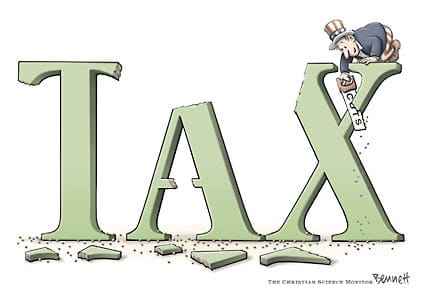Tax cut truth


Most commentators agree that Tim Pawlenty's proposal of an annual five percent further reduction in taxes, even for wealthy Americans, makes little sense and is simply an attempt to outflank the rest of the GOP presidential hopefuls. But, the real problem, as clearly stated by former Reagan economist Bruce Bartlett in his article in The Fiscal Times, is that broad-based tax cuts, such as the ones supported by nearly all Republicans and some Democrats, actually work against growth.
Real economic growth, Bartlett points out in the article, is based not on tax cuts, tax indexing or any other tax policy, but on deficit reduction. And the proven reality of continuing the Bush tax cuts (which both parties & Obama supported last year), much less increasing tax reductions, is that they will raise the deficit, hence slowing growth.
Bartlett goes back to basics to identify key causes of economic growth, summarizing from a reference text by noted Harvard economics professor Gregory Mankiw, who served as Chairman of the Council of Economic Advisors for President George W. Bush:
"The key determinant of the amount of capital available to workers is saving -- foregone consumption from current production. In general, more saving will lead to more investment, and more investment will raise productivity and growth."
Bartlett goes on to disclose that there is no evidence whatsoever that the 2003 tax cut did anything to increase business investment -- a major tenet in the argument that tax cuts to high income earners will result in growth (hence, job creation).
"Indeed, according to the Federal Reserve," Bartlett writes, "nonfinancial corporations have increased their holdings of liquid assets to $1.8 trillion from $1.2 trillion since 2003. Thus it's implausible that a further reduction in the corporate rate, as Pawlenty and other Republicans favor, would do much to raise investment."
Do politicians, especially Republicans, know this economic truth? Of course they do. And it is hard to believe that mature, intelligent and skilled politicians are simply acting on ideology alone (with the exception of a certain number of politicians who are truly uneducated about or uninterested in history). Under any circumstance, it would appear to be a disastrous short-term direction for the United States that may well lead to serious long-term consequences just at the time that we are facing monumental competition from China, India and other emerging national economic powers.


